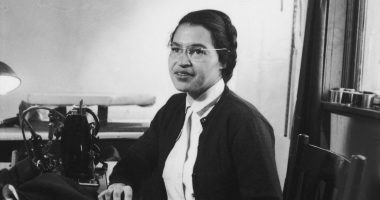
Note: FlaglerLive on Wednesday morning, well before this article appeared, requested the names of the members of the hiring advisory panel and their vote tallies on the candidates for the principalship. As of midday Thursday–more than 48 hours after the request was placed and 36 hours after HR Director Bob Ouellette claimed in an email that the article inaccurately reported that Abra Seay was the leading choice–the district had yet to provide the requested information.
![]()
Superintendent LaShakia Moore’s choice of Cari McGee as Bunnell Elementary’s next principal says as much about Moore’s willingness to buck recommendations and trust her own instinct as it does about McGee, a committed and–like Moore, opinionated and socially conscious–leader who a few years ago signed her name to an open letter condemning “inaction in the face of oppression” and lambasting Nancy Pelosi for using the language of white supremacy.
When McGee got her first of two master’s degrees, she was awarded Michigan State University’s Excellence in Diversity award. Now that she’s working on a doctorate, her research interests “primarily surround examining social factors impacting learning outcomes for African American students and students with disabilities,” according to her current profile at the University of North Florida.
Those details may go some distance to explain Moore’s choice for a school leadership that has had deep, largely self-inflicted challenges in how it previously handled and mishandled African-American students.
The 12-member hiring committee had not recommended McGee among the applicants. Out of some seven applicants it had recommended Abra Seay, an assistant principal at Rymfire Elementary, and previously an assistant principal at Flagler Palm Coast High School, who’s been pursuing a principalship of her own. But the more one learns about McGee, the more the appointment appears self-evident.
The appointment at Bunnell was likely Moore’s most delicate since she became superintendent only a few weeks ago. She was interim superintendent when the scandal over the school’s segregated assemblies upended the school and Moore’s nascent tenure. Moore last July had appointed Donelle Evensen, a friend and colleague of long date, the principal at Bunnell. It was her first appointment of note. It soon unraveled.
Evensen, an internal investigation showed, had approved a plan by a teacher, Anthony Hines, to single out just the school’s Black students, whether they were high performing or not, for a pair of assemblies and lectures about their need to perform better on standardized tests. Not doing well, they were told, could lead them to jail or worse.
Evensen had not been the only administrator involved: Marcus Sanfilippo, the previous principal, had also been part of the discussions before Moore elevated him to a district position. The investigation did not find him substantially responsible for the outcome of the assemblies. He kept his job. Evensen and Hines resigned. McGee, who had been an assistant principal, stepped in as interim.
Michael Rinaldi, the district’s coordinator of professional standards, had twice interviewed McGee during the internal investigation and found that “she was not involved in the planning at all” of the Aug. 18 assemblies–which focused on 4th and 5th graders–“and did not even know that there was an assembly” until the evening of that school day, when she started reading about it on Facebook. She had been copied on an email by Evensen describing how Black students exclusively would take part in the assemblies, but she had not seen it. The most–and the only thing–she’d heard about the assemblies was in passing, from two teachers who seemed surprised at the end of that day that the assemblies had taken place.
The assemblies drew national attention and caused Moore to hold the first press conference since Jim Tager, a previous superintendent, had held one in the aftermath of the shooting death of a student in 2019.
Read Related Also: ‘This is a relationship that cannot be mended’: Attorneys successfully withdraw from ‘eyedrops killer’ case during dramatic hearing over bizarre handwritten letter
The scandal also tested Moore’s mettle in her new role. Clearly, she passed: her handling of the situation and its aftermath won her praise from a school board that itself has been roiling public embarrassment month after month, if for different reasons. Then Moore did something the board had failed to do for itself: she unified it in the vote that named her the permanent superintendent. The board implicitly endorsed a management style that is very much its own, that cares nothing for groupthink and that has no qualms standing up to board members. Anyone who works with Moore knows, or should know, that, in her own words, “they’re going to be working with someone that is pretty opinionated at times about things and how they’re done.”
In that scheme of things, overriding a hiring committee’s recommendation was a minor step–and a signal to her administration that Moore would be putting her own stamp on what she means by “Flagler Forward.”
McGee, who was previously known as Cari Hankerd, is and is not an insider at Bunnell Elementary. In other words, she’s built several years’ worth of familiarity with the school and its community, but is not of it. That, too, may have been part of Moore’s thinking by way of fresher restarts. McGee was hired as an assistant principal at Bunnell Elementary in July 2019, when Tager was superintendent. She had been a teacher and school counselor in Volusia County schools since 2006, with a break between 2009 and 2013, when she worked–for some of that time–at a high school in Michigan.
A spare release issued by the district Monday afternoon noted that McGee graduated from Western Michigan University in 2004 with a Bachelor of Arts in Social Psychology, with a focus on the social psychology of race. She earned a Master of Arts in Counseling Education from Michigan State University in 2006 and another Master’s degree, in Educational Leadership, from American College of Education, an accredited online school, in 2018.
McGee is currently working toward her doctorate in Educational Leadership from the University of North Florida, where she is one of just six scholars enrolled in what’s referred to as Project Spiders, an acronym that stands for School-University Partnerships Influencing aDvocacy and Engaging Rural Special educators. The three-university partnership is funded by a $3.5 million grant from the U.S. Department of Education. Its aim is to “prepare and equip rural special education leaders with the knowledge, skills, and dispositions to lead rural districts forward” in special education.
Notably–strangely–the district’s release passed in silence all of McGee’s awards or distinctions as an emerging specialist in diversity education, as if those qualities are better left unspoken in a county and a state where the words “diversity” and “anti-racism” have become cause for state-sanctioned suspicions in school districts or outright bans in higher education and state workplaces: last May Gov. Ron DeSantis signed a law prohibiting the spending of any money on diversity, equity and inclusion programs in colleges and universities.
“Cari McGee knows the children, families, teachers, and staff at Bunnell Elementary,” Moore was quoted as saying in the release. “When I asked the stakeholders at BES what they want in their next leader, they said they wanted a person who would listen and be active in our community. I’m confident Ms. McGee is that person.” (The release also passed in silence the recommendation vote. A FlaglerLive request for the committee’s line-up and vote on all candidates had not been honored by the time this article initially published.)
In 2018, after then-Speaker of the house Nancy Pelosi took issue with Rep. Maxine Waters telling her supports to confront Trump administration officials over what she considered the inhumane separation of migrant families at the U.S.-Mexico border, McGee added her name to a list of over 6,000 signatories to an open letter to Pelosi by “a grassroots coalition of white women who are fed up with white supremacy and trying to do something about it.”
“When you attack a Black woman for speaking out about injustice, and when you call for ‘civility’ in the face of blatant racism,” the letter read in part, “you invoke a long history of white supremacist power. Writing Black women’s words off as divisive, and chastising them for raising the alarm on unjust behavior, is not merely condescending — it echoes racist tropes that have been used for centuries to dehumanize Black people and support the structures that maintain discrimination.”
It continued: “But of course, racism and sexism are inextricably intertwined even in the America of 2018, a place where the perceived fragility of white women is still weaponized and deployed in order to initiate and justify racialized violence. This must stop, and you can help lead that charge.”
![]()










